Tim Duy:
The FOMC concluded its two-day meeting today, and the results were largely as I had anticipated (dự đoán). The Fed took note of the recent data, downgrading the pace of activity from "solid" to "moderated." They continue to expect inflation weakness to be transitory. The risks to the outlook are balanced. And "patient" was dropped; April is still off the table for a rate hike, but data dependence rules from that point on.
Growth, inflation and unemployment forecasts all came down. Especially important was the decrease in longer-run unemployment projections. The Fed's estimates of NAIRU are falling, something almost impossible to avoid given the stickiness of wage growth in the face of falling unemployment. The forecast changes yielded a downward revision to the Fed's interest rate projections. In addition, the strong dollar was clearly on the Fed's mind. Federal Reserve Chair Janet Yellen often referred to the dollar and its impact on growth in the press conference, much more than I expected. I think they are probably happy the dollar took a hit today. On net, I think this from last week stood up well:
...assuming the Federal Reserve takes sufficient note of the rising dollar, and its impact on inflation, by lowering the expected path of short term interest rates. And perhaps this is exactly what is revealed in next week's Summary of Economic Projections. Look for the possibility next week that the Fed is both hawkish - by opening the door for a June hike - and dovish - by lowering the median rate projections in the dot plot.
Note that the Fed is capitulating here. The distance between the bond market and the Fed rate expectations has been something of a conundrum (/kəˈnʌndrəm/ n đau đầu, hóc búa) for policymakers. But it is now clear the bond market is not moving toward the Fed; the Fed is moving toward the bond market. Going forward, they still believe that their rate forecast is accommodative (thích nghi). Based on the new estimate of NAIRU and New York Federal Reserve President William Dudley's recent estimate of the equilibrium (/ˌiːkwɪˈlɪbriəm/ n cân =) rate, they are correct:
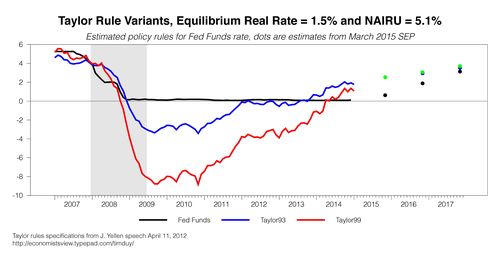
But if you assume a lower equilibrium interest rate, the Fed's rate forecast has more downside to it if they wish to remain accommodative:
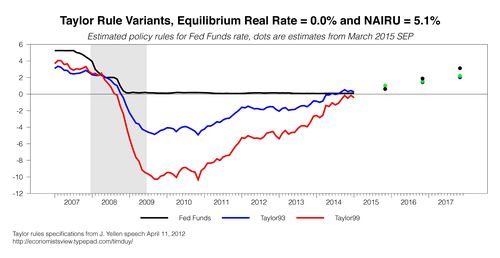
For what it's worth, this is what San Fransisco Federal Reserve President John Williams' research suggests about the current equilibrium rate:
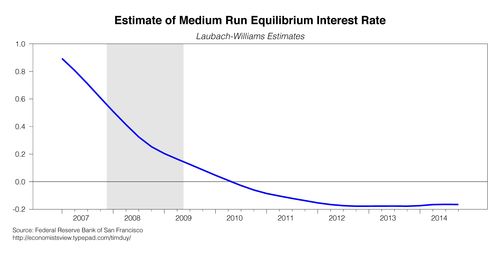
Is June really on the table? Regarding the timing of the first rate hike, the FOMC had this to say:
The Committee anticipates that it will be appropriate to raise the target range for the federal funds rate when it has seen further improvement in the labor market and is reasonably confident that inflation will move back to its 2 percent objective over the medium term.
Yellen was pushed to quantify "reasonably confident" during the press conference, but she declined to give a mechanical answer. Actual inflation, the path of the labor market, wage growth, and measures of inflation expectations were all fair game in the assessment. She did say wage growth was not a precondition (điều kiện tiên quyết) for rate hike. I tend to think that unemployment dropping to 5% or an acceleration in wage growth is sufficient to prompt the first rate hike, either of which could still happen by the time of the June meeting. That said, at this point, the inflation and growth data point to a later lift-off, and weighting the expectations for a rate hike at a later date seems appropriate at this juncture.
Bottom Line: Yellen does it again - she moves the Fed both closer to and further from the first rate hike of this cycle. By moving toward the markets on the path of rate hikes, the Fed acknowledges that they are eager to let this recovery run on. Moreover, they proved that they are in fact data dependent by moving policy in the direction of the data. Overall, Yellen has managed the transition away from what the Fed came to see as excessive forward guidance just about as well as could be expected.
After declare, Dow go up strongly and USD Index go down sharply.
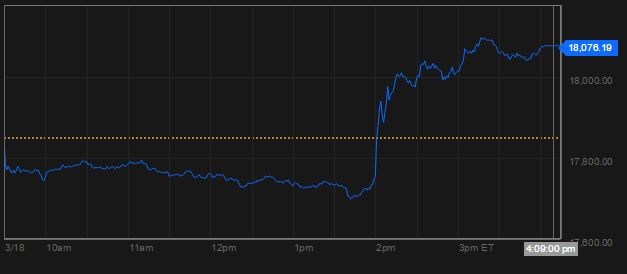
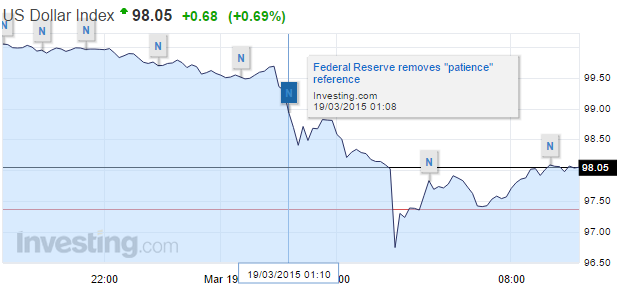
Source: economistsview